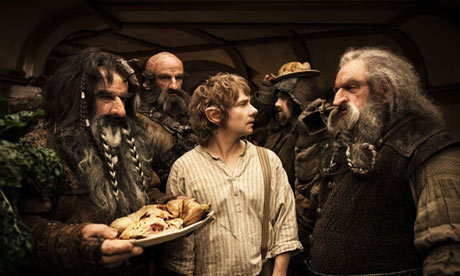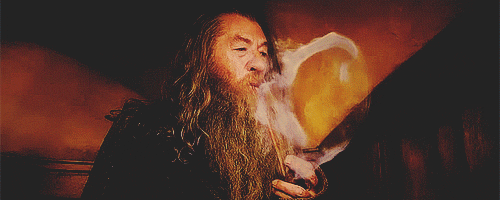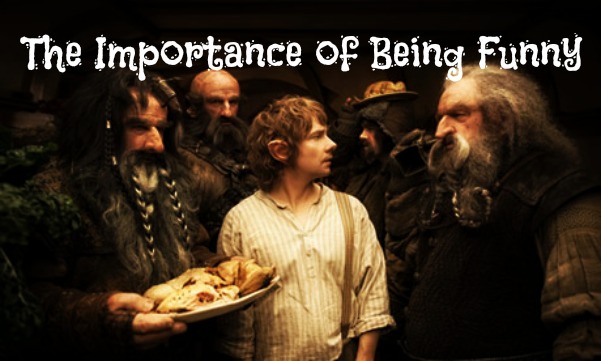Part of this essay is based on a term paper I wrote for my English 333 class at BYU
This is mainly about The Hobbit but I cite Steve and Bucky as an example because Civil War is still on everyone’s minds.
Steve: Remember that time we had to ride back from Rockaway Beach in the back of that freezer truck?
Bucky: Was that the time you used our train money to buy hot dogs?
Steve: You blew three bucks trying to that stuffed bear for a redhead.
Bucky: What was her name again?
Steve: Dolores. You called her Dot.
Bucky: She’s got to be 100 years old right now.
Steve: So are we, pal.
(source: Pinterest)
Bucky and Steve exchange memories of each other in order to build trust. This particular exchange also pokes fun at their situation. Steve calls up that memory specifically because they are in Siberia and it is freezing cold. They are both ridiculously old in years even though they don’t look it. And in this moment, we get a fair glimpse of Bucky’s former self, and when Steve sees that he knows they can go on with their mission. Captain America: Civil War was dark, but the humor made it a much better film than it would have without it. My favorite movies are a mix of humor and whatever other genre they’re supposed to be.

Humor is what makes life enjoyable, period. A friend of mine works in hospice and frequently associates with morticians. She commented recently that some people think that the jokes they crack in their professions are irreverent, but the truth is if they didn’t poke fun at their jobs they would go crazy.
So, to the meat of this week’s discussion: J.R.R. Tolkien knew the English language inside and out and how to use its creative potential. He used that knowledge of how language works to invent his own languages, of course, but he also used it to build worlds and stories, in prose as well as in verse. A lot of people roll their eyes and skip his poems when reading The Lord of the Rings or The Hobbit but I think some of Tolkien’s poetry is exceptionally beautiful. The poetry that Tolkien wrote for his work was part of the literary grounding and backstory that he created for Middle-Earth and to define the characters. While today’s movies use dialogue and action to create humor, Tolkien used poetry.
One of the few parts I liked in the Hobbit films, because of how closely it stuck to the book, was this scene where the dwarfs poke fun at Bilbo’s anxiety about the mess they’ve made in his house. Bilbo has already had fourteen houseguests turn up out of nowhere. They’re loud, they’re noisy, they’re messy, and he has to wait on and clean up after all of them. And when they start cleaning up, Bilbo is afraid they’re going to create a bigger mess and starts to fuss. That’s when the dwarves begin singing:
Chip the glasses and crack the plates!
Blunt the knives and bend the forks!
That’s what Bilbo Baggins hates-
Smash the bottles and burn the corks!
Cut the cloth and tread on the fat!
Pour the milk on the pantry floor!
Leave the bones on the bedroom mat!
Splash the wine on every door!
(source: LOTR Wiki)
The ditty prods Bilbo’s fears of their violating his forced hospitality. Breaking into song about breaking the plates and blunting the knives might sound like the worst thing the dwarves could do in that situation. But, Tolkien writes, “they did none of those dreadful things, and everything was cleaned and put away safe as quick as lightning” (13). Singing while they work sets a rhythm and helps them get the job done. Furthermore, it helps them to gain Bilbo’s trust: they need him to be their burglar and break into Smaug’s lair for them. In fact, they might feel bad about asking an innocent hobbit to do such a huge favor for them in the first place. The humorous song is a ritual or a form of social magic that invites Bilbo to relax and see the humor in the situation for himself. From scholar Janet Croft we read, “The way the hobbits [and other characters] joke about serious emotions has elements of ritual, as they do it to protect themselves from despair and to show ‘a descent solicitude for the feelings’ of the person with whom they are speaking.” (13). Bilbo might think that the dwarves don’t care about him, but in fact the silly song shows that they care a lot.

Via Rebloggy
Humor is a sign that we relate to other people and that we understand what is going on around us. Humor is a way that we show off our personality, and displaying our funny side can open doors to relationships and strengthen existing ties. It’s not a laughing matter that humor is a serious form of communication.
Humor, in some instances, can be an appropriate way to cope with fear or danger. Music and rhyme controls fear because you have to focus in order to remember and recite. Making up insulting rhymes about your enemies on the spot gives a person a place for the mind to go instead of on their immediate fears. When rescuing the dwarves from the Mirkwood spiders, Bilbo makes up a couple of songs to aggravate the spiders.
Old fat spider spinning in a tree!
Old fat spider can’t see me!
Attercop! Attercop!
Won’t you stop,
Stop your spinning and look for me!
Lazy Lob and crazy Cob
are weaving webs to wind me.
I am far more sweet than other meat,
but still they cannot find me!
(source: Tolkien Gateway)
Tolkien as narrator comments that the songs are “Not very good perhaps, but then you must remember that he had to make it up himself, on the spur of a very awkward moment. It did what he wanted anyway (145).” Bilbo’s insults and jabs at the spiders are intentional: if he can make them angry and get them to come after him, then he has a chance to go back and rescue Thorin’s company. He does not want to become a spider’s meal, but in playing on the spiders’ desire for meat he acknowledges his own fears as well.

herocomplex.latimes
Furthermore, singing is a way of communicating to the dwarves. By singing in the face of danger, Bilbo shows that he is able to keep a clear head in a frightening situation and thus reassures them of rescue. The rescue in the forest is an important moment for Bilbo’s character: it shows that he is embracing the adventure and his role as the dwarves’ burglar. Joking around doesn’t make the danger less serious but it helps you to remain calm enough to act. Humor helps maintain a sense of normalcy when things seem chaotic.
To recap, humor is essential because it is a way of not letting the scary stuff get to you. Humor alleviates stress and communicates to those around you that you understand them. In our favorite books and movies, humor communicates to the audience that they can release some of their tension. There is always some positivity to be found in both imaginary worlds and real life. The trick is to look for it.
Source:
Croft, Janet. “The Great War and Tolkien’s Memory: an examination of World War I themes in The Hobbit and The Lord of the Rings.” Mythlore. 23.4 (2002): 4-21. Web. From Literature Resource Center. 5 April 2012.

